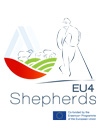- Educational Information Centre
- EURAXESS Център за мобилност и кариерно развитие на изследователите
-
Centre of European integration, international and public relations
- Ръководство и Състав
-
International educational projects
- The FarmForward Project: Sustainable and Transformative Strategies for Climate-Resilient Agriculture in VET
- Agricultural Policy and Sustainability in Vocational Education
- Training and Orientation for Multifunctional Agriculture enTrepreneurial Opportunities – eTOMATO
- New Professional Diploma in Plant Clinic and Phytosanitary Technologies/PRO-DPCP
- Innovative training for sustainable shepherds - EU4SHEPHERDS
- BOOST – „Ускоряване на агробизнеса и създаване на мрежи от цифрови хъбове чрез програма за модерно обучение по устойчиво прецизно земеделие“
- Research projects
- Проекти по оперативни програми
- Членство в организации
- Двустранни споразумения
- Centre for Career Development
- Centre of Continuing Education
- Center for Support of Students with Special Educational Needs
- Център за иновативни образователни технологии
- Centre of information and communication technologies
- Distance education centre
- Agroecological Centre
- Centre of research, technology transfer and protection of intellectual property rights
- 17+1 Demonstration Center for e-commerce with agricultural and other products
- Academic publishing house
- Training and experimental fields
- Учебно-опитна винарска изба
Calendar
 - Events on the occasion of the 80th anniversary of AU
- Events on the occasion of the 80th anniversary of AU
Innovative training for sustainable shepherds - EU4SHEPHERDS

Extensive livestock exploitation models are crucial for the sustainable maintenance of important rural areas in Europe. These models are the paradigm of ecological, social, and economic sustainability:
• They fight against depopulation in rural areas and have a positive impact on animal wellbeing and human health compared to other non-extensive models.
• These models supply consumers with quality foodl products in many EU territories and promote the sustainable development of our society.
The future of such livestock exploitation models, currently under threat due to the effects of climate change and administrative barriers, depends on the availability and capacity of extensive Shepherds. But the problem is that it is increasingly difficult to find well-trained shepherds that have the knowledge and experience to face all the aspects involved in extensive livestock shepherding. Shepherds are an aging social group. The younger ones lack proper training, education, and experience, and nowadays there is no motivation to become a shepherd due to the low social standing and lack of a specific professional training offer.













